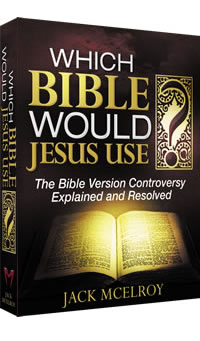Why should God's Word be restricted to English?
Jack: Because that's another question we're constantly getting. "Why should God's word be restricted to English?"
David: God has to pick a language. Just like He did in the beginning: He picked a people. He picked a man, Abraham, Isaac, Jacob. He went through his family line. He brought us to Messiah. He set up the church, and only the church. Jesus is the Way, the only Way.
Jesus worked through languages. We have the Hebrew. We have the Greek. We have the Old Latin. And then we had the Germanic languages. And finally, God prepared another world language. And nobody can deny: English is that world language. And one reason is because of the preservation of the word.
This is something that God did. He could have picked anybody. This is just what He picked. And we're blessed to speak English, praise God.
But I'm telling you: if you have a translation of God's word that agrees, meaning for meaning with this Book, then you have the same words of God. That's what God wanted in the first place: that all the Bibles in all the different languages would agree.
And by the way, pick whatever modern Bible you want. Even take an NIV and a Nueva Version Internacional, a Spanish NIV, and they don't even agree. So don't let anybody fool you into thinking, "Oh, there's agreement with the modern, scholarly Bibles," because there's certainly not.
Jack: Boy, that's a good thing to know.
And you know, one of the things I've thought of, is that if God has a Bible...
Now as you've commonly heard, and probably been taught the same thing in Sunday school and all the messages that we've heard, "Well, we know that the Bible was written in Hebrew in the Old Testament, and in Greek in the New Testament." Whether or not all of that is true is another story. However, nonetheless, at the end of the day, we are on this side of the invention of printing. And there has to be one Book.
There has to be one language for that Book, so you can cross-reference something in the New Testament to something in the Old. Otherwise, everybody would have to know Hebrew, and everybody would have to know Greek. And have you ever noticed, that most of the time, somebody goes to school and they learn Greek. And then they'll tell you, "Well, what the original language says is such-and-such."And usually they'll go "around the block" and it will turn out to be exactly what you heard in English. But nonetheless, I don't see too many people doing that with Hebrew. Occasionally they'll do that. But they really don't know Hebrew.
God cares about His children. And He wants His children to have His word. And that means it has to be one Bible.
Just like He created them male and female, and of the two He made "one flesh." So of the two Testaments He made one Bible. And that's what we need: one Bible, which you can hold in your hand, and which you can study and learn. And you can cross-reference a word from the New Testament and run it back to the Old and see how it was used in the Old. One thing I've noticed in modern versions is that the cross-references don't work anymore.
Like for example (Mark 8:36),
"For what shall it profit a man, if he shall gain the whole world, and lose his own" -- what? "soul." And yet, if you go check the NIV, I believe it may say that in the New Testament. But then in the Old, instead of the word "soul," they say, and God "breathed into his nostrils the breath of life, and the man became a living being." Now I don't know about you, but "soul" I get. "Being," I'm not actually sure what that means.
All I do know is that they don't match. And you can't cross-reference the word from the New Testament into the Old. So there's another one of the hidden dangers of new versions. The cross-references don't work.
- See more articles on related topics:
- Bible Versions
- King James Bible
- Bible Translation
- History of Preservation
Products of interest:
-

Answers to Your Bible Version Questions
224 pages
David W. Daniels answers difficult questions about the KJV. Learn how to defend the KJV and why you can trust it. -

Can You Trust Just One Bible?
160 pages
Answers to the most common anti-KJV accusations. -

Which Bible Would Jesus Use?
342 pages
Everyone's got an opinion as to which Bible is best. If Jesus walked into your church, which Bible would He quote from? -

Did the Catholic Church Give Us the Bible?
208 pages
The Bible has two histories. One is of God preserving His words through His people. The other is of the devil using Roman Catholic "scholars" to pervert God’s words and give us corrupt modern Bibles.
